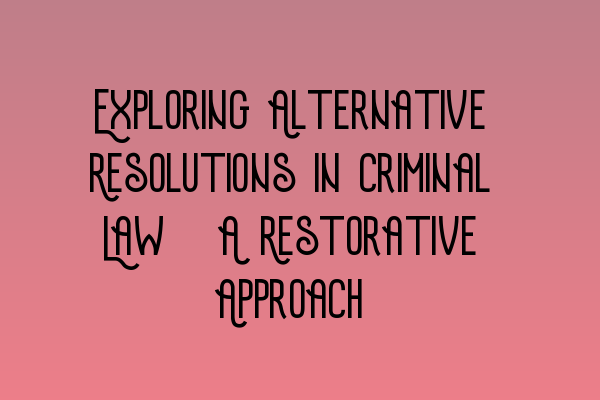Exploring Alternative Resolutions in Criminal Law: A Restorative Approach
As criminal law practitioners, we are all too familiar with the traditional adversarial system that focuses primarily on punishment and retribution. However, in recent years, there has been a growing recognition of the limitations of this approach and the potential benefits of exploring alternative resolutions that focus on restoration and healing.
The restorative approach in criminal law aims to bring together all parties involved – victims, offenders, and the community – to address the harm caused by the offense and find ways to repair it. It seeks to shift the focus from punishment to understanding, accountability, and reconciliation. In this blog post, we will delve deeper into the restorative approach and its implications for criminal law practice in the UK.
The Principles of Restorative Justice
At the heart of the restorative approach are a set of principles that guide the process:
- Inclusion: All stakeholders, including the victim, the offender, and the community, have a voice and are actively involved in the resolution process.
- Empowerment: Participants are empowered to express their needs and concerns and are involved in finding solutions that meet those needs.
- Accountability: Offenders are held accountable for their actions and are given the opportunity to take responsibility and make amends to the victim and the community.
- Restoration: The focus is on repairing the harm caused by the offense, both tangible and intangible, through actions that promote healing, rehabilitation, and reintegration.
By adopting a restorative approach, criminal law practitioners can not only contribute to the well-being and satisfaction of victims but also address the underlying causes of criminal behavior and reduce recidivism rates.
Restorative Justice in Action
One way to implement restorative justice in criminal law is through a process called victim-offender mediation. This involves bringing together the victim and the offender in a controlled and supportive environment to encourage dialogue, understanding, and the potential for resolution.
During the mediation session, facilitated by trained professionals, the victim has the opportunity to describe the impact of the offense, express their emotions, and ask questions. Similarly, the offender is given the chance to gain insight into the consequences of their actions, express remorse, and propose restitution.
By participating in victim-offender mediation, victims often report feeling heard, validated, and empowered. Offenders, on the other hand, may experience a sense of accountability, empathy, and an opportunity for personal growth and rehabilitation.
The Role of Criminal Law Practitioners
As criminal law practitioners, it is essential to be knowledgeable and skilled in restorative justice practices. This requires a deep understanding of the principles and techniques of restorative justice, as well as the ability to effectively navigate and facilitate the resolution process.
To further enhance your skills in restorative justice and broaden your knowledge of criminal law, consider exploring the SQE 1 Preparation Courses offered by SQE Criminal Law & Practice Law UK. These courses not only cover the core subjects tested in the SQE exams but also provide comprehensive insights into alternative resolutions in criminal law.
Additionally, staying up-to-date with the latest developments in restorative justice and criminal law is crucial. Keep an eye on the SRA SQE Exam Dates to ensure you are aware of the upcoming exams and can adequately prepare yourself.
Conclusion
Exploring alternative resolutions in criminal law through a restorative approach holds immense potential for improving the outcomes of criminal cases, promoting healing and reconciliation, and reducing the societal impact of crime. By embracing restorative justice principles and expanding our skill set in this area, we can contribute to a more balanced and humane criminal justice system.
If you are preparing for the SQE exams, make sure to leverage the valuable resources provided by SQE Criminal Law & Practice Law UK. Check out the SQE 1 Practice Exam Questions and the SQE 1 Practice Mocks FLK1 FLK2 to enhance your preparation and boost your confidence.
Together, let us embrace the restorative approach and work towards a criminal justice system that not only punishes but also heals, restores, and transforms lives.
